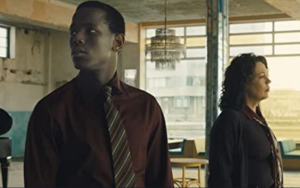EMPIRE OF LIGHT: 3 STARS. “a love letter to film and grand old movie palaces.”
 “Empire of Light,” a new drama from director Sam Mendes, takes almost two hours to deliver the same magic-of-the-movies message Nicole Kidman’s AMC advertisement drove home in just one minute and one second.
“Empire of Light,” a new drama from director Sam Mendes, takes almost two hours to deliver the same magic-of-the-movies message Nicole Kidman’s AMC advertisement drove home in just one minute and one second.
Set in 1981, Olivia Colman plays Hilary Small, a lonely duty manager at a Margate cinema called The Empire. She is fastidious, detail oriented and on top of every little thing, even if she doesn’t really care for the movies she shows in their beautiful Art Deco auditoriums. “They’re for the customers,” she says.
Her personal life is as messy as her work life is ordered. An illicit affair with her boss, Mr. Ellis (Colin Firth), the theatre’s general manager, is a study in power imbalance and an unnamed mental illness leaves her unable to sleep and reliant on lithium to maintain equilibrium.
Stephen (Micheal Ward), a new theatre employee, fits in perfectly with the others, Neil (Tom Brooke), punk rocker Janine (Hannah Onslow) and projectionist Norman (Toby Jones) but really sparks with Hilary, even though she is many years his senior.
At the theatre romance blossoms between them, but in the outside world the rise of the National Front troubles Stephen, and he is regularly harassed by skinheads simply because he is a Black man living in Britain.
As Mr. Ellis prepares to host the regional gala premier of “Chariots of Fire,” events conspire to change the nature of Hilary and Stephen’s relationship, and perhaps the rest of their lives.
“Empire of Light” takes on a lot but does not seamlessly blend its many ideas into a whole. A study of racism, mental illness, power structures and the transformative power of the movies, it is splintered into too many pieces to work as a cohesive story. When Mendes focusses his camera on Hilary and Stephen the movie finds its power, when he does not, it drifts.
Colman, in the film’s most demanding role, once again proves her remarkable ability to inhabit a character. Hilary is a complex person, and as her depression grips, she boards an emotional rollercoaster. Colman carefully and sensitively portrays that aspect of Hilary’s life in a terrific performance, filled with humanity and sympathy.
Opposite Colman in the film’s best scenes is Ward. As Stephen, in a career making performance, he brings empathy to the film. In one of his early moments, he helps a pigeon with a broken wing. That action could have served as an overworked metaphor, given his budding relationship with the damaged Hilary, but instead establishes Stephen’s innate decency in a world that does not always return the favor. Conversely, Ward’s steeliness comes through in several scenes of outrageous racism.
At its heart “Empire of Light” is a love letter to film and grand old movie palaces like The Empire. But once again, Mendes uses the metaphors like a jackhammer on concrete. In an impassioned speech, Toby Jones, who calls the theatre’s projectors his “babies,” explains the magic of the movies to Stephen. “Still images with darkness in between,” he says. “If I run them at 24 frames a second, you don’t see the darkness.” Jones delivers the line with breathless reverence, as if the idea that film as a panacea for all that ails us was something new instead of a clunky metaphor. The “Cinema Paradiso-esque” veneration is well intended, but, given the film’s essaying of racism and mental illness, feels overstated and trite.
